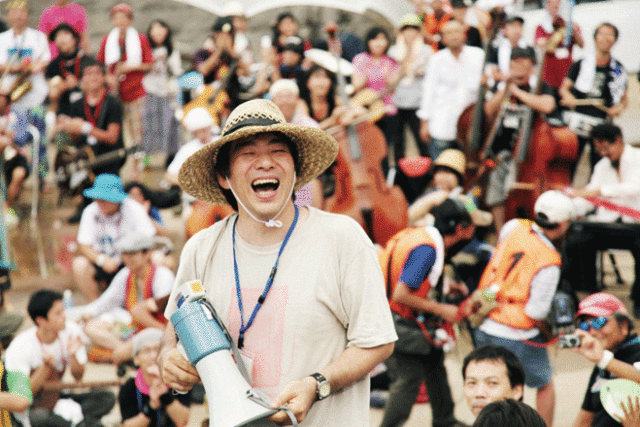By Nicholas Turner
The North American Post
In commemoration of the fifth anniversary of Great East Japan Earthquake, “Project Fukushima! The Future is in Our Hands” will feature a documentary film screening and musical performance on May 2 and 3 in Seattle. The Northwest Film Forum, a local theater in Capitol Hill, will host the free screening of “Project Fukushima!” on May 2. The documentary follows Yoshihide Omoto and other Japanese artists and musicians as they put together a festival in Fukushima only five months after an earthquake and tsunami hit the island country’s Tohoku region in 2011. Otomo will perform at Chapel Performance Space in the Good Shepherd Center in Wallingford on the following day. The film, which features music and poetry by Otomo, Michiro Endo, Ryuichi Sakamoto and Ryoichi Wago among others, tells the story of Fukushima residents and how the disaster changed everything.
The 9.0 magnitude earthquake killed over 15,000 residents, injured over six thousand and left 2,500 missing on May 11, 2011 in the Tohoku region. The Fukushima Daiichi Nuclear disaster led an unparalleled and tragic case of radioactive contamination, the aftermath
of which has been looming on the residents of Fukushima ever since.
In deciding to carry out the festival, despite the catastrophe, Otomo and his fellow festival organizers ran into many ethical issues. Cancelling the event, they decided, would cause even more damage. Two months after the earthquake, they made the following declaration: “On August 15, 2011, we will hold a festival focused on music in Fukushima.
We will also carry out diverse projects on a long-term basis using this event as a springboard. The title for the event is Fukushima! … Through the festival, we will let the entire world know about Fukushima as it is now, and as it will be in the future. We are determined to turn Fukushima into a positive word.”
Since then, the festival has been held annually on Aug. 15, a day of special significance for the people of Japan. According to the project’s website, the first year of the event had a sense of desperation about it. The festival hung a sign that read “The Future is in
Our Hands,” under which more than ten thousand people gathered from Fukushima, around the country and the world. The second festival, held in 2012 under the theme “Flags Across Borders,” called for unity among the people of Fukushima, some of whom sought decontamination while others wanted to leave altogether.
In the third year, the festival focused on dancing and enjoyment with live music to an original Bon Odori song called “Eejanaika Ondo”, which means “Who cares?!”
“The joy of dancing stimulates the instinctive human desire to live,” the project website reads. “To be alive.” Slowly, the festival came to embody a celebration of the Fukushima residents and its unique flavor of culture, instead of reminding them of its unfortunate past. “Fukushimaʼs future is important to us, so we are keeping in touch with the rest of the world and maintaining our hopes of continuing to live in this land,” The website states. “Our thoughts on the future of Fukushima may well lead to thoughts on the future of the whole of post-earthquake Japan. For that too, we need festivals. We are convinced that
the culture emerging from Fukushima can become a driving force for all of our lives.”
Hideo Makihara, the organizer for this event, is looking forward to connecting with people in Seattle. He said that the film, along with Yoshihide’s solo performance, might lead them to think about Japan—and Seattle—in a different way.
“The film makes us think about what we can do right for future generations,” He said. “It talks quite a lot about radiation, but we can replace the word ‘radiation’ with any other environmental issue. Such as climate change, for example.”
These sentiments are especially important in light of the 7.0 magnitude earthquake that struck the Kyushu region in Japan last Saturday, killing dozens of people right after a 6.2 magnitude quake shocked the area just two days earlier. While Project Fukushima! tells
the story of a town trying to escape a dark past, it also introduces Japan as a proud country that stands resilient to the devastation of natural disaster.
“Art [will] not remove the radiation, but it can help people heal,” Makihara said.
Those wishing to attend the film screening can register for free online at http://bit.ly/pjfuku. The screening will begin at 7 p.m.
The Otomo’s concert will be $5-$15 sliding scale for admission. The event will begin at 8 p.m. More information can be found at http://bit.ly/otomosea.







